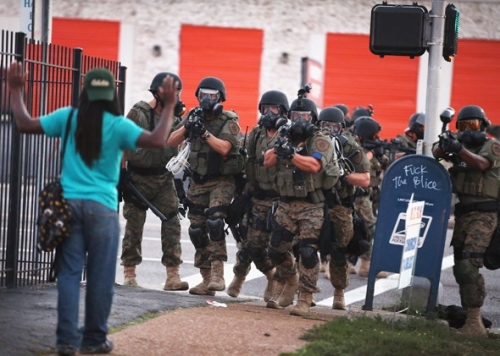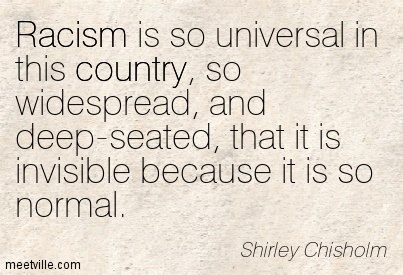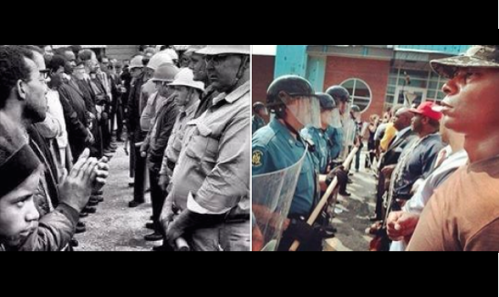**this post was originally shared at Spice Tithers
Since I wrote a post on white supremacy over the weekend, I’ve been having a lot of conversations about whiteness. And I don’t like it. To talk about whiteness is to saddle up the angry elephant in the room and ride that sucker around.
In America, whiteness is our default. I catch myself in conversations with my husband where I’m describing a new acquaintance and I’ll describe everything about her BUT her race if she’s white. If she’s not, race is the first thing I usually mention. White is my default. Everyone else is other. I’m learning to see whiteness.
And what I’m seeing when I see whiteness isn’t just race. I’m seeing the lies behind the labels. I’m seeing my own fears and biases. (If you want to borrow my mirror on this, there are bias tests that can help you see your own ugly.) This week, I shared this comment on Facebook. It felt like a plea for help, like all confession does.
I don’t condone destruction or looting. I have to ask, though, why collectively we’re more concerned about storefronts and the destruction of property than we are about loss of human life? Why are we more afraid of a large group of unarmed angry black protestors than we are of armed angry white protestors? I’m asking these questions of myself as much as I’m asking any of you guys. When it comes to racism, there may be differing degrees of complicity and perpetration, but we’re all in recovery together. Let’s admit we have a problem…Hi, my name is Cayce and I’ve adopted racist constructs and fears.
Most of the conversations I’ve been having about whiteness go off the rails immediately. The biggest obstacle to productive discussions and reflection comes when a white person I’m talking to says, “Are you calling me a racist?” I’m immediately put on the defensive, and compelled to walk back what I’ve said, etc. because where we live, being called a racist is worse than actually being one. Now, there are a lot of fantastic resources on the web to deal with this particular derailment. (My favorite is this one.)
But the truth is, no matter what facts you give, no matter how you walk it back or try to explain it, the accusation that you’ve called a white person a racist just sticks. So from here on, I’m changing my strategy. If you ask me am I calling you a racist, I’m going there with you:
Yes. You are a racist. So am I. Let’s get some help.
If I’ve learned anything from my walk with Jesus, if someone is calling me out, I will want to fight it. But every confrontation with the truth goes easier for me if I surrender quickly. So, my reputation as a white person with racist attitudes is out there.
There is a fear in facing the whiteness and all the privilege it entails. We can’t seem to look it in the eye. There are a lot of reasons for that, but I think the most likely is this: we like the lie.
Bejamin Corey addresses this at Patheos:
If we admit to the existence of systemic racism in America, it will prove false the American narrative so many of us grew up believing…We can’t admit that systemic racism exists, because that will mean the narrative we were taught about America is a huge lie…If we admit to the existence of systemic racism in America, it makes us guilty…We don’t want to admit it because we’d have to admit that we’ve been complicit in the sin by not addressing the sin…If we admit to the existence of systemic racism, it would demand costly change.
We are being told that Michael Brown attacked an armed man and tried to take his gun. The people who are telling us this hail from that universe where choke-holds are warm-fuzzies, where boys discard their skittles yelling, “You’re gonna die tonight,” and possess the power to summon and banish shotguns from the ether. These are the necessary myths of our country, and without them we are subject to the awful specter of history, and that is just too much for us to bear.
…
Taken all together, the body count that led us to our present tenuous democratic moment does not elevate us above the community of nations, but installs us uncomfortably within its ranks. And that is terrifying because it shows us to be neither providential nor exceptional, and only special in the subjective sense that our families are special—because they are ours.
As Coates points out, we have a distorted view of our history in America. We want the good old story so bad, so we will refuse to see the connections of the evils in our past and the evils in our present.
The Bible makes it clear that there’s nothing new under the sun. Perhaps it’s because despite our lip-service to the contrary, we don’t really want to learn our lesson. But God has given us everything we need for life and godliness. He’s given us the opportunity to start again. He died and brought Himself back so that we could know the liberation of confession, forgiveness, and contrition. He’s given us His Word to bring us hope and to teach us what to do. He’s calling us to stand with the oppressed.
Greg Ogden writes:
The symbol of justice in our society is a blindfolded woman, indicating that justice is blind. The fair judge is dispassionately objective, free from bias, who rationally decides what is right before an impersonal law. On the other hand, the role of the judge and justice in Israel was to actively and redemtively seek to protect the poor from the wiles of the rich and powerful. So strong was the skepticism toward the powerful that the poor in the courts were often viewed collectively as the innocent and the righteous…
Time and again we see God’s prophets rail against the abuses of the powerful. To those of us living under the illusion of “American justice” as it stands today, reading the Scriptures can be disconcerting. We want to explain this aspect of God’s character away with a hermeneutic, “Well, He meant poor in spirit. Well, He meant that for that time, and that culture only. He doesn’t do that to nations or expect that of us anymore.” We just ‘splain these texts away.
To us, Biblical justice feels unfair. It feels like partiality. Because it is.
God in His wisdom, has accounted for our propensity for sin and abuse of power. He has anticipated our behavior, both the individual and the collective, and He talks about it. A lot.
Again I looked and saw all the oppression that was taking place under the sun:
I saw the tears of the oppressed—
and they have no comforter;
power was on the side of their oppressors—
and they have no comforter…
He also gives us a solution for these problems in confession, repentance, and ultimately, solidarity:
Two are better than one,
because they have a good return for their labor:
If either of them falls down,
one can help the other up.
But pity anyone who falls
and has no one to help them up.
Also, if two lie down together, they will keep warm.
But how can one keep warm alone?
Though one may be overpowered,
two can defend themselves.
A cord of three strands is not quickly broken.-Ecclesiastes 4
The privileged among us don’t just stand in solidarity just to be helpful. We are called to need the oppressed. The oppressed keep us accountable for our complicity in oppression. They remind us of the suffering servant Jesus. They give us the opportunity to participate with God in an act of restorative justice. They shatter our insulated, white-informed [un]consciousness with their prayers of lamentation:
We are touching the bibles handed down from our great-grandparents gnarled hands to our smooth, desk-working ones. We are reciting the promises inside them. Those who are peacemakers will plant seeds of peace and reap a harvest of righteousness. Blessed are those who mourn, for they shall be comforted. Yea, though I walk through the shadow of death, I will fear no evil, for thou art with me. Thy rod and thy staff they comfort me.
You promised, we pray, as though we’ve been betrayed. You promised, we repeat, as though we may have been forsaken. But we’d forgotten that we are still walking and that the shadow of death may not look like a hospital bed at the end of a long, storied life, but instead like a city on lockdown, asphyxiating its citizens, imposing a curfew on all who seek justice, donning riot gear and rolling tanks simply to protect a police officer who murdered someone whose skin looked like our own.
(There is still time left, right, Lord? There’s still time, isn’t there, for You to redeem these dark times?)
Please. Please. Just be patient. We are making our way. But you must understand that it is hard, when we are cordoned on all sides by toxic clouds. Surely, you can empathize with how difficult it is to be clear-eyed while gagging on these cannisters of cover-ups.
We’ve worked hard to build this American narrative: of founding fathers, hearth-tending mothers, courageous colonizers, forbearing minorities, and magnanimous white benefactors. But hard work does not a truth make. We have become like the blacksmith constructing an idol in Isaiah 44:
The blacksmith takes a tool
and works with it in the coals;
he shapes an idol with hammers,
he forges it with the might of his arm.
He gets hungry and loses his strength;
he drinks no water and grows faint.
The carpenter measures with a line
and makes an outline with a marker;
he roughs it out with chisels
and marks it with compasses.
He shapes it in human form,
human form in all its glory,
that it may dwell in a shrine.
He cut down cedars,
or perhaps took a cypress or oak.
He let it grow among the trees of the forest,
or planted a pine, and the rain made it grow.
It is used as fuel for burning;
some of it he takes and warms himself,
he kindles a fire and bakes bread.
But he also fashions a god and worships it;
he makes an idol and bows down to it.
Half of the wood he burns in the fire;
over it he prepares his meal,
he roasts his meat and eats his fill.
He also warms himself and says,
“Ah! I am warm; I see the fire.”
From the rest he makes a god, his idol;
he bows down to it and worships.
He prays to it and says,
“Save me! You are my god!”
They know nothing, they understand nothing;
their eyes are plastered over so they cannot see,
and their minds closed so they cannot understand.
No one stops to think,
no one has the knowledge or understanding to say,
“Half of it I used for fuel;
I even baked bread over its coals,
I roasted meat and I ate.
Shall I make a detestable thing from what is left?
Shall I bow down to a block of wood?”
Such a person feeds on ashes; a deluded heart misleads him;
he cannot save himself, or say,
“Is not this thing in my right hand a lie?”
It’s time to acknowledge the singe story we’ve told ourselves, and admit we’ve bought into a system of oppression. We’ve believed it. We defended it. We’ve taught our children to love it. We have worshipped the idol and laid waste to the image of God that He set before us in the bodies of our black brothers and sisters.
 Acknowledging the truth about America doesn’t mean I hate it. It doesn’t negate the sacrifice people before us have made with their lives. For the love of God, Christ died for sinners while they were still sinners. We’re no exception to that because we’re American or because we’re white. We’re full of error. And that is an amendable fact if we own up to it.
Acknowledging the truth about America doesn’t mean I hate it. It doesn’t negate the sacrifice people before us have made with their lives. For the love of God, Christ died for sinners while they were still sinners. We’re no exception to that because we’re American or because we’re white. We’re full of error. And that is an amendable fact if we own up to it.
 We have to ask ourselves if we have biases that inconsistent with God’s justice. Who gets the benefit of the doubt? Who gets scrutiny? Who do we easily love? Who do we easily fear? These aren’t fun questions. The answers are often embarrassing. But they don’t have to be the last word because we have a remarkable capacity for change.
We have to ask ourselves if we have biases that inconsistent with God’s justice. Who gets the benefit of the doubt? Who gets scrutiny? Who do we easily love? Who do we easily fear? These aren’t fun questions. The answers are often embarrassing. But they don’t have to be the last word because we have a remarkable capacity for change.
Am I racist? Yes, but I might not be racist tomorrow. It’s possible to do better. Rather than defending my reputation, I want to change my posture and seek to be saved from this. I have to hold out hope, despite the things I’m seeing to the contrary, that us white people can get it right.

